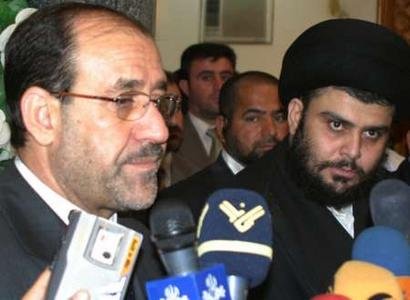Over at the Huffington Post (via AP), Qassim Abdul-Zahra and Brian Murphy raise an interesting point regarding the political crisis currently gripping Iraq’s fragile parliamentary patchwork.
They note leadership in Iran is desperately clinging to their power proxy in Baghdad – Prime Minister Nouri al Maliki, and his factional allies in the Iraqi National Alliance. Their ruling coalition is critically hemmed to shaky support from Muqtada al Sadr’s bloc. (If you recall, this ultimate marriage of political convenience was built upon the ashes of hot conflict between ISF troops, and al Sadr’s Mehdi army back in 2008.) However, that support seems to be wavering. Just Sunday, al Sadr suggested al Maliki “do the right thing,” and resign – now the firebrand cleric is being pressured by his allies in Iran stand down, in deference to political status quo.
As noted at HuffPo:
A collapse of al-Maliki’s government would be a potential stinging blow to Iran’s ruling system, which is already nervous about the future of its other critical Middle East ally, Syria’s embattled President Bashar Assad. It also presents a rare convergence of interests between Tehran and Washington, which also views the wily al-Maliki as perhaps the only viable Iraqi leader for the moment.
To be clear, criticism of al Maliki doesn’t end with the Sadrists. Iraq has suffered a succession of deeply tangled political crises that began back in mid-December. Ayad Allawi’s Iraqiyya list initiated accusations that al Maliki was assuming dictatorial control of the state, anchored in confessional lockstep with his fellow Shi’a in parliament. These crisises were tied, in no small part, to the arrest warrant issued for fellow Iraqiyya lister, Tariq al-Hashemi, (a Sunni) who was accused of fielding a hit squad tasked with the murder of Shi’a government officials.

Messrs. Maliki (left) and Sadr (right) in happier times…
Iraqiyya exists as the formal, parliamentary opposition in a calcified legislature that has failed to pass any substantial legislation other than its budget. While this probably says something altogether lousy about the shape of our representative democracy here in the States, Iraqi governance risks fracture if al Sadr’s tenuous relationship with Mr. Maliki can’t hold.
As I wrote for The American Spectator nearly a year ago, al Sadr’s decision to withdraw his party’s support for al Maliki’s ruling coalition would constitute the political demolition of the Iraqi parliament – more damaging than anything his Mehdi Army might have accomplished.
Mere months ago, analysts were suggesting that al Maliki had emerged from a series of potentially destabilizing political crises wielding even more power over his government, and more popularity within his strictly Shi’a constituency. Present circumstances challenge those presumptions.
According to an interesting report by NPR’s Peter Kenyon, the PM’s adversaries are numerous, and they all share one thing in common – fear of a man who’s assuming a Saddam-esque stature.
The Kurds are convinced he’s ready to attack them as soon as the Americans deliver promised F-16 fighter jets to the Iraqi air force.
The Sadrists are convinced he’s planning to evict them from the ruling coalition, and [Baghdad analyst Ahmad al Abyadh] believes another Shiite group in Maliki’s bloc, known by the acronym ISKI, could be wavering.
Of course, all this spells trouble for al Maliki, who has stacked his cabinet and the national bureaucracy with political allies, but may ultimately lack parliamentary support to maintain his ruling coalition. No matter, to him – I suppose – if he’s truly committed to parroting the last dictator that ruled Iraq from Baghdad.
As ever, a collapse of the democratic experiment on the Tigris looms large. Too soon to tell if the current PM will survive this political crisis, but faced with the hardening of autocracy vs. the disintegration of parliament, this undoubtedly spells “B-A-D-N-E-W-S” for the Iraqi people.
What else is new?